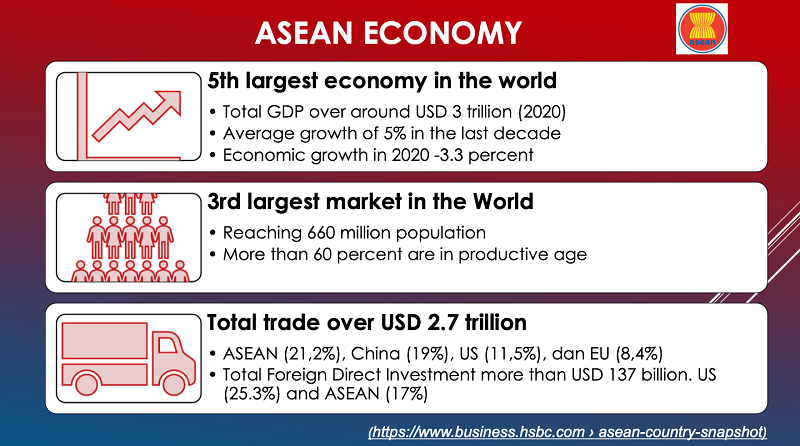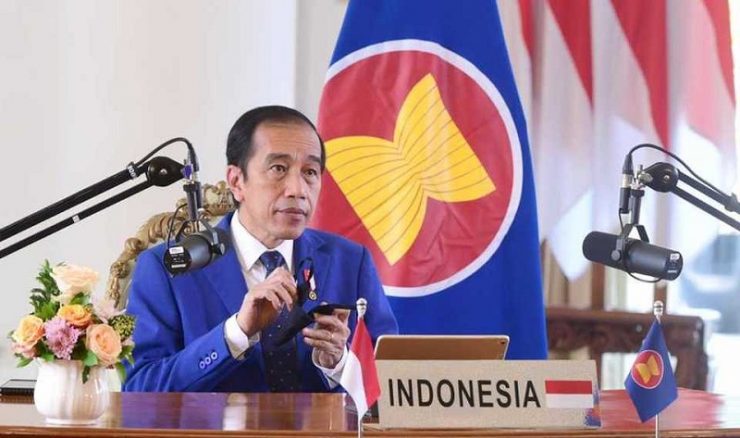IN ASEAN’s journey, Indonesia has always positioned itself as a player to take initiatives. Not only in dealing with countries outside the region, but in resolving internal disputes within ASEAN. For example, being active in settling Cambodia’s political problems and taking a firm stance on Myanmar.
I conveyed this in a discussion with ASEAN Youth Ambassadors of Indonesia. The participants of the ASEAN Virtual Youth Model were positive and engaging.
My appreciation to the Ministry of Foreign Affairs of the Republic of Indonesia for inviting me to share my experiences in ASEAN. Discussions from the “ASEAN Virtual Model for Youth” is proof that the Indonesian youth as representatives from various regions in the country are concerned on the future of ASEAN. In my discussion with them, I shared on Indonesia’s important role in ASEAN.
One of the ASEAN creators
As we know, Indonesia is one of ASEAN’s founding members. Represented by Foreign Minister Adam Malik, Indonesia’s vision was to form an ASEAN that is able to make the Southeast Asian region stand alone and defend itself from negative influences from outside the region.
Indonesia was also an initiator of the establishment of the ASEAN Political and Security Community in 2003. At the ASEAN Summit in Bali, October 2003, the ASEAN Leaders adopted the Bali Concord, which formed an ASEAN Community consisting of 3 pillars, namely: the ASEAN Political Security Community, ASEAN Economic Community and the ASEAN Socio-Cultural Community.
In the practice of diplomacy, Indonesia also mediated internal conflicts and civil wars in Cambodia. In 1991, Indonesia invited four warring Cambodian factions to a meeting in Jakarta. After that, the meeting continued to the Paris Conference for Cambodia which was attended by 19 countries.
In addition to the functions and roles above, Indonesia also represents ASEAN in world peace. Some of its roles include supporting the movement of a nuclear free zone in the region of ASEAN member countries and supporting the implementation of the ASEAN Free Trade Area (AFTA) in ASEAN member countries.
Several issues that require attention touch on the latest development of the regional situation. Notably issues of the US-China rivalry in the Indo-Pacific, Covid-19, the current developments in Myanmar, climate change, economic cooperation, and education.
A. ASEAN Centrality
(Competition of great powers in Southeast Asia and Indo-Pacific)
Indonesia and other ASEAN member states and China have been developing the concepts and principles contained in the Declaration on the Conduct of Parties in the South China Sea. Now we are facing great powers who want to destabilize the region. In the current context, Indonesia is wise in taking its position. Because if you take a wrong step, it will only plunge its member countries into the locus of proxy.
In this regard, I am of the view that ASEAN must continue to be able to manage the situation by respecting basic principles and international law and maintaining good relations with all parties.
Ambassador Dr. Siswo Pramono in a book published last October (The Rise of Asia and the ASEAN Outlook on the Indo-Pacific, “A New Outlook: Strengthening cooperation between Canada, Indonesia and ASEAN in the Indo-Pacific”, October 2021) discusses this. Pak Siswo highlighted the curiosity of some superpowers towards the Indo-Pacific Concept. Will the rise of Asia change the rules of the game as we know it today?
I think we should agree with Ambassador Siswo’s analysis, that the rise of Asia and the Indo-Pacific concept is a wise option. Each region needs to have mechanisms for constructive dialogue, more cooperation and more partnerships with the rest of the world. I find that ASEAN’s idea to use a mechanism that ASEAN leadership has in it can develop the Indo-Pacific construct.
B. Democracy in Myanmar
Myanmar is still haunted by various trials. It started with protests from the people, economic collapse, and the exodus of refugees since the coup on February 1, 2021.
The ASEAN Leaders have agreed on a “five-point consensus” on the situation in Myanmar, namely for: an immediate cessation of violence in Myanmar and for complete restraint; constructive dialogue to seek peaceful solutions for the benefit of the people; the ASEAN Chair’s special envoy to facilitate mediation with the assistance of the ASEAN SG; providing humanitarian assistance through the AHA Centre; and sending special envoys and delegates to visit Myanmar to meet all relevant parties.
The main thing is to give full and unhindered access to the Special Envoy of the Chair of ASEAN to facilitate the dialogue mediation process and the delivery of humanitarian assistance.
C. COVID-19
ASEAN must continue to combat discrimination and politicization of vaccines, and voice the importance of equal access to vaccines for all. It is known that the current two-dose complete vaccination rate in ASEAN is still 10% below the world average. So, it needs to be accelerated to match the world’s vaccination achievements.
The COVID-19 ASEAN Response Fund should be turned into a robust regional health fund, to fund access to medical devices, diagnostics, medicines and vaccines in times of emergency. The ASEAN Regional Health Supplies Reserve needs to be continuously strengthened.
D. Economic Cooperation
The Asian Development Bank (ADB) Outlook 2021 estimates that ASEAN’s economic growth in 2022 is 5%. It is natural for ASEAN to emphasize the importance of recovering safe tourism travel from Covid-19. Therefore, the implementation of the travel corridor deserves to be started immediately.

As an area with advanced internet development, the digital economy must continue to be utilized for the benefit of all member countries. It is very promising, that the digital economy has reaped revenues of US$100 billion. This is a “stepping stone” for economic development in the ASEAN Region and can be noted as one of ASEAN’s contributions to global economic recovery.
E. Climate change and Education
Although ASEAN countries are not the pioneers of world environmental damage, they make an important contribution to reducing pollution. According to the report on ASEAN Cooperation on Climate Change, September 2021. Several countries, including Indonesia, have committed to reducing emissions by 26% for 2020. Indonesia can even reduce it again up to 41% if assisted by international donors.
Another important area is the education sector. As a region with great human resource potential, ASEAN must continue its initiatives to establish cooperation between educational institutions. In this case, the first step is to conduct joint research and increase student exchange and student exchange through the credit transfer system program and other related mechanisms.
Epilogue
Indonesia’s efforts to make ASEAN active have been proven. Over the years, there has been economic growth and also regional prosperity. That’s what makes Southeast Asia one of the engines of world growth.
The view of Foreign Minister Retno Marsudi 4 four years ago during a speech commemorating the 50th anniversary of ASEAN’s birth in Manila was, “ASEAN’s success can be seen from our peaceful and stable region with economic growth above the world average”. I think this view is still very relevant.
The keyword here is active. According to Max Walden (Foreign Affairs, December 4, 2021) President Jokowi is “a leading statesman on the regional state”. Of course, this cannot be achieved instantly. The evolution of struggle with strong determination.
I hope that these discussions and activities such as the ASEAN Virtual Model for Youth, can add insight to the younger generation. Indonesia is a large country whose existence is fully understood by other countries in the world. Not only economic potential, political attitudes, natural resources but also human resources, that I discussed on December 5, 2021 last week. I am sure that the ASEAN Youth Ambassadors of Indonesia are ready to dedicate themselves to this beloved region, with thoughts that go far beyond the region. My hope is only one. Don’t stop learning!
- [Bagas Hapsoro, Indonesian Ambassador to Sweden and Latvia (2016-2020), Deputy Secretary-General of ASEAN (2009-2012). The views and opinions expressed in this article are those of the author]. [photo special]
















